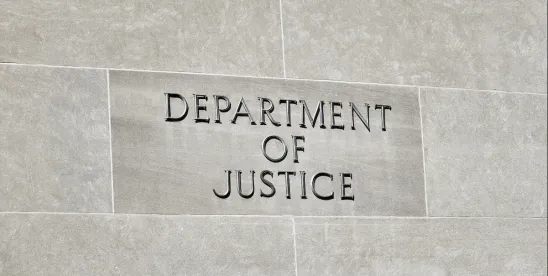After years of suggesting that modifications were in the works, the Department of Justice recently proposed drastic changes to the Foreign Agents Registration Act (FARA) that would, among other things, profoundly limit one of the most widely used registration exemptions. Below we discuss the notable proposed changes and the effect a new Attorney General, who herself has registered under FARA, could have on the likelihood of these changes actually occurring. Key shifts include proposed changes to the:
- Commercial Exemption
- Legal Exemption
- Requirements Regarding Informational Materials
- Treatment of Tourism Activities
FARA requires disclosure and transparency relating to certain activities performed on behalf of foreign governments, companies, individuals, nonprofits and other foreign principals, such as “political activities” that include lobbying federal officials and trying to influence American public opinion about US policies or a foreign principal’s interests. DOJ first indicated an intent to revise FARA, for the first time since 2007, in December 2021 when it solicited comments from the public on several FARA-related topics. Three years later, on December 20, 2024, the Department took the next step in the process by posting a NOPR with its recommended changes. The public has 60 days to comment, after which the Department will craft final regulations.
Proposed Changes to the Commercial Exemption
FARA includes several registration exemptions, including for “bona fide commercial activity and other activity not serving predominantly a foreign interest.” 22 U.S.C. § 613(d). Currently, the commercial exemption focuses on whether the activities are commercial, rather than political, in nature. This provision has two parts: (d)(1) exempts traditional “private and nonpolitical” commercial activities, and (d)(2) exempts “other activities not serving predominantly a foreign interest.” While the text of (d)(2) is not limited to commercial activity, DOJ’s regulation interpreting (d)(2), 28 CFR § 5.304(c), effectively creates that limit by focusing on commercial interests and limiting “foreign interest” to mean foreign governmental interest. Indeed, the current DOJ FARA FAQs provide that activities conducted on behalf of a state-owned enterprise may qualify for this exemption so long as the activities are not directed by a foreign government or political party or do not directly promote the public or political interests of the foreign government or political party. This exemption has been central to FARA registration analysis, as it permits a wide swath of activities on behalf of foreign interests.
In December 2023, the Department indicated an intent to significantly narrow (d)(2) to exempt only activities that predominantly benefit a “domestic” interest, and the proposed rule does just that. The Department proposes shifting the analysis to a “totality of the circumstances” approach that would make the exemption unavailable whenever the Department determines that a foreign interest “predominates,” regardless of whether that foreign interest is a private commercial interest, a non-profit interest or a governmental/political interest. This proposal would drastically increase the type of activity that requires registration. The revised rule could apply to many organizations operating in the United States, including multinational corporations and US nonprofits that accept grants from abroad and that work in or facing the United States on behalf of private foreign interests. Moreover, the new position would be in tension with many of the FARA Unit’s existing Advisory Opinions, upon which companies and practitioners rely, potentially creating significant confusion should the changes be made.
Proposed Changes to the Legal Exemption
The Department also is proposing to expand the “legal exemption,” which applies to “[a]ny person qualified to practice law, insofar as he engages or agrees to engage in the legal representation of a disclosed foreign principal before any court of law or any agency of the Government of the United States” so long as the representation does not involve other attempts to influence or persuade agency personnel or officials. 22 U.S.C. § 613(g). The expansion would allow attorneys to provide information about a legal “proceeding, inquiry, or investigation” during its pendency to the press or other persons. The Department is not proposing changes to this exemption to address the eligibility of non-attorneys, as some practitioners have sought.
Proposed Changes to Informational Materials
FARA requires registrants to, among other duties, “conspicuously label ‘informational materials’ transmitted in the United States for or in the interest of a foreign principal” and file those materials with the Department. Under the current regulations, “informational materials” is not specifically defined and potentially encompasses a wide range of documents and communications. This poses a challenge for registrants both in determining what materials to label and, given changes in modern communication such as social media, how to label certain new forms of information sharing.
The proposed rule would define the term “informational materials,” with the proposed definition incorporating the well-known concept of “political activities” (i.e., efforts intended to influence US policy or public opinion). It would also require registrants to include their registration number and their foreign principal’s country in the legally required disclaimer on all “informational materials.” Finally, the proposal would create specific disclaimer placement rules depending on the method of dissemination:
- Social media posts – placed in each social media post disseminated by the registrant and include a link to the FARA registration.
- Op-eds and similar – placed in the author’s byline, signature block, or bio.
- Website and social media profiles – placed on the “home” and “about” pages of any website or platform for which the registrant has administrative rights.
- Audio-only or audio-visual materials distributed via television, radio, text, website, digital application, or motion picture – placed at the beginning and end of the materials.
Proposed Changes to Treatment of Tourism Activities
Much to the surprise of many, the FARA Unit has for more than four decades considered tourism promotion a “registrable activity.” In the proposed rule, the Department has “reconsidered that position,” and “now believes that the promotion of recreational and business tourism is too attenuated” to foreign governmental and political interests to require registration. To reflect this shift, the Department proposes a new subsection under 28 C.F.R. § 5.304(b) that would treat “transparently promoting bona fide recreational or business travel to a foreign country” as “private and nonpolitical activities” that are exempt under (d)(1) of the commercial activities exemption. Such a shift would be significant, allowing many tourism promoters to deregister.
The Bondi Factor
Pam Bondi, President-elect Trump’s nominee for Attorney General, is widely expected to be confirmed by the Senate and take charge of the Department of Justice, and thus the FARA Unit, before the 60-day comment period is over, and well before any final regulations are implemented. Following her tenure as Florida Attorney General, Bondi worked at Ballard Partners, a lobbying firm, where from 2019-2020, she registered under FARA for her work on behalf of the Government of Qatar, including “provid[ing] guidance and assistance in matters related to combating human trafficking.” Though it is impossible to predict exactly how, AG Bondi’s personal experience with FARA will certainly influence the rulemaking process, as she understands first-hand the implications of the proposed changes.
All in the Enforcement
While the proposed changes are indeed significant, how the Department applies any new regulations through its Advisory Opinions and enforcement actions will be the real test of whether they truly effect a meaningful change in FARA regulation and enforcement. These Opinions are not strictly binding and are sometimes inconsistent, but they are the primary source of public insight into the Department’s thinking. The NOPR affirms that these Opinions will continue to serve this important role, and Bracewell will continue to monitor them for meaningful updates.




 />i
/>i

